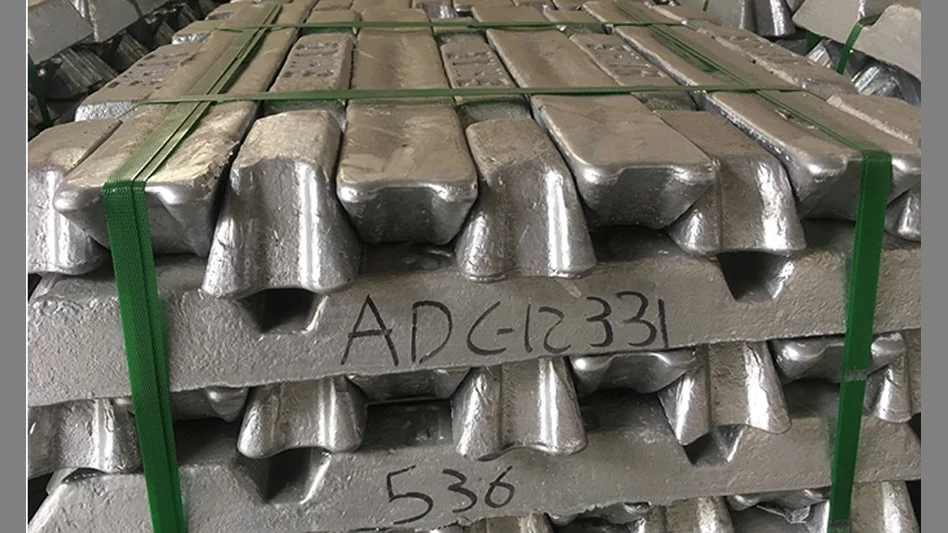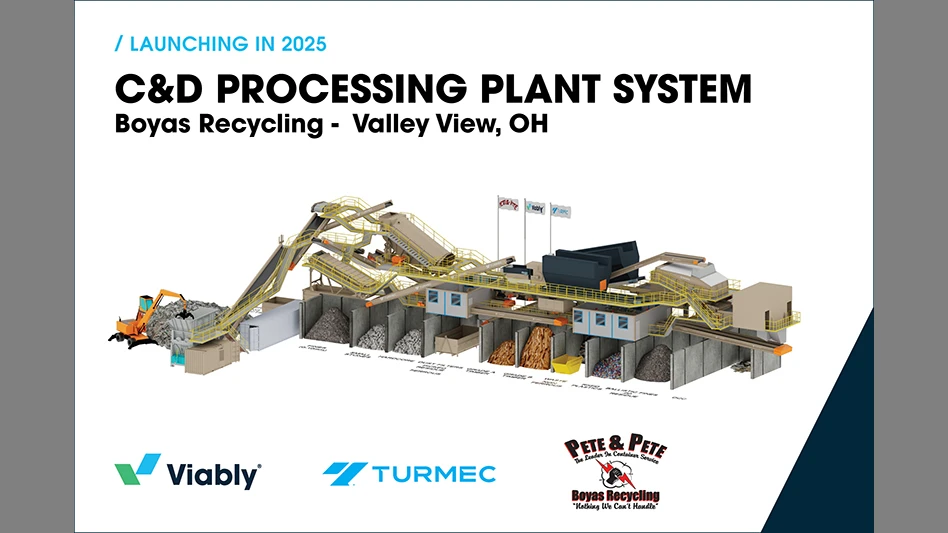
Novelis to build $2.5B aluminum recycling, rolling plant
Novelis Inc., Atlanta, has announced it will invest $2.5 billion to build an aluminum recycling and rolling plant in Bay Minette, Alabama, that can produce 600,000 metric tons of finished aluminum goods annually. Site work is underway, and the company says it expects to begin commissioning in mid-2025.
According to a news release from Novelis, more than half the capacity of the new facility will be used to serve growing demand for aluminum beverage can sheet in North America, which is driven by consumer preference for more sustainable packaging. In addition to the beverage can market, the facility will serve the automotive market.
“Through this investment, we are making a demonstrative commitment to continue to grow alongside our customers and meet their needs for low-carbon, highly sustainable aluminum solutions,” says Steve Fisher, president and CEO of Novelis. “In addition, we are well-positioned to efficiently expand capacity at this facility in the future … to capture ongoing strong demand. Our readiness to invest to serve growing markets is a perfect example of how we are delivering on our company purpose of shaping a sustainable world together.”
The company says the facility will be the first fully integrated aluminum mill built in the U.S. in 40 years. It is expected to create up to 1,000 high-paying, advanced careers in modern manufacturing. With this addition, Novelis says it will soon be able to recycle 90 billion cans globally, up from the 74 billion used beverage cans the company currently recycles.
Novelis North America President Tom Boney says the facility will serve the South and southeastern regions of the country. Some of the customers it will service include Ford, General Motors, Coca-Cola and Ball Corp.
According to Novelis, the facility will have several environmental features and will aim to be net carbon neutral for Scope 1 and 2 emissions. It will be powered primarily by renewable energy, will use recycled water and will be a zero-waste facility. The plant also will rely on rail transportation, which can reduce logistics-related carbon emissions by up to 70 percent compared with road transport, according to Novelis.
Additionally, the company says the plant will make use of advanced automation and digital technologies, including artificial intelligence. Additionally, augmented reality will be used to train employees, diagnose issues and ensure efficient operations.
“This investment marks the start of another transformational growth phase for Novelis,” says Kumar Mangalam Birla, chairperson of Novelis’ parent company, Aditya Birla Group, and the Novelis board of directors. “We continue to invest in each of the markets Novelis serves, from beverage can to automotive, aerospace and specialties and in all geographies.”
Novelis says its decision to build a fully integrated, greenfield recycling and rolling plant was in response to strong North American demand for flat-rolled, low-carbon aluminum from can makers and beverage companies. Additionally, the company has seen increased demand for aluminum in the automotive industry.
“We’ve seen year-over-year growth of automotive demand for the last 42 years ... as more and more automotive companies adopt aluminum into their vehicles,” Boney says. “Lightweighting continues to be a driver to make sure that the internal combustion engine vehicles are more fuel-efficient. But they’re also taking advantage of those characteristics for the battery-electric vehicles. As the battery weight increases, they get better performance and better mileage out of the battery vehicles by adopting aluminum as well.”
Recently, Novelis broke ground on a $365 million investment in a recycling center in Guthrie, Kentucky, that will be able to cast 240,000 tons of sheet ingot for its automotive customers per year. The facility is expected to reduce Novelis’ carbon emissions by more than 1 million tons annually.
Boney says Novelis North America plans to continue meeting consumer demand through various projects, though he does not provide details.

MetalX acquires Indiana aluminum furnace operator
MetalX, based in Fort Wayne, Indiana, says it has agreed to acquire the assets and business of SRT Aluminum in Wabash, Indiana. SRT is a secondary aluminum melting operation that converts aluminum scrap into specification remelt scrap ingot (RSI) in sow and ingot form.
MetalX describes itself as an independent scrap metals recycling business engaged in nonferrous scrap processing and trading, consulting and management services for industrial generators and consumers. It was founded in 2012 by Danny and Neal Rifkin, third- and fourth-generation members of the Rifkin family who previously co-owned and helped manage OmniSource Corp. Late last year, the company sold its ferrous processing business to Australia-based steelmaker BlueScope for a reported $240 million.
According to MetalX, SRT’s Wabash facility uses electric induction and reverb furnaces to produce 75,000 tons of aluminum sow and ingot annually. The SRT plant is located on a 40-acre site that also includes an aluminum shredder and turnings processing operation.
MetalX says SRT Aluminum employs 120 people, “all of whom are expected to become MetalX employees postclosing.”
“Incorporating aluminum melting capabilities has been a key element of our overall strategy for some time,” MetalX CEO Danny Rifkin says. “This acquisition gets us immediately into the business in a meaningful way and is a solid platform for growth. Additionally, it secures our own production needs, broadens our service offerings for existing customers and supports our focus on developing new and sustainable methods to create high-quality scrap and secondary products.”
“We’ve had an excellent commercial relationship with SRT over the years and look forward to the SRT employees joining the MetalX team,” MetalX Executive Vice President Neal Rifkin says.
He adds, “We view aluminum melting as a valuable and complementary addition to our scrap business and see tremendous potential to grow the business, including new projects to increase capacity.”
Bruce Warshauer, SRT managing member, says, “We believe this transaction will be good for our customers, our employees and our ownership group, which has operated and grown SRT Aluminum since acquiring it in 2009.”
SDI to acquire Mexican scrap firm
Steel Dynamics Inc. (SDI), Fort Wayne, Indiana, says it has entered into a definitive agreement to acquire the equity interest of Monterrey, Mexico-based multilocation scrap processing firm Roca Acero S.A. de C.V. SDI says the purchase, for an undisclosed amount, will “be funded with available cash.”
Roca Acero operates four scrap processing facilities, including at least one that has an auto shredder. SDI calls the Rocca Acero facilities “strategically positioned near high-volume industrial scrap sources located throughout central and northern Mexico.”
The company’s combined facilities ship approximately 575,000 gross tons of scrap annually and have an estimated annual processing capacity of approximately 850,000 gross tons, SDI says.
Roca Acero will become the second Mexico-based scrap firm acquired by SDI, following its 2020 purchase of Zimmer S.A. de C.V., also based in Monterrey.
“We look forward to adding ROCA to the Steel Dynamics family to further solidify our Southwest U.S. and Mexico growth strategy,” says Mark D. Millett, chair, president and CEO of the electric arc furnace (EAF) steelmaker.
“Combined with our existing North American metals recycling facilities, the addition of Roca significantly strengthens our raw material procurement strategy in the region,” Millett continues. “After closing the Roca transaction and fully integrating our Mexican metals recycling operations, we believe our Mexican scrap facilities will provide an even more meaningful competitive advantage to our United States EAF steel operations while also providing a high-quality, customer-centered option for our outside scrap customers. We are very excited to welcome and learn from the entire ROCA team.”
SDI Executive Vice President and Chief Financial Officer Theresa Wagler tells Recycling Today the acquisition was made in part because “Mexico is prime scrap long.” Thus, Roca Acero can supply prime grades to the SDI flat-roll mill in Sinton, Texas.
The ferrous shred from the Roca Acero shredder yard also potentially can find a home at SDI mills, with the company taking measures to seek higher qualities of shredded scrap to use at its melt shops. (See “Big impact, small footprint” for more on SDI.)
In Recycling Today’s 2017 article on Roca Acero’s shredder installation, the company’s Lizette Camarillo says, “Nowadays, local markets need to be more competitive in order for supply to cover their demands. We are looking to diversify our products and reach markets with higher added value.”

Explore the July 2022 Issue
Check out more from this issue and find your next story to read.
Latest from Recycling Today
- Radius to be acquired by Toyota subsidiary
- Algoma EAF to start in April
- Erema sees strong demand for high-volume PET systems
- Eastman Tritan product used in cosmetics packaging
- Canada initiates WTO dispute complaint regarding US steel, aluminum duties
- Indianapolis awards solid waste contract, updates recycling drop-off program
- Novelis produces first aluminum coil made fully from recycled end-of-life automotive scrap
- GPR’s hubbIT platform recognized in Georgia State University’s Marketing Awards for Excellence in Innovation





